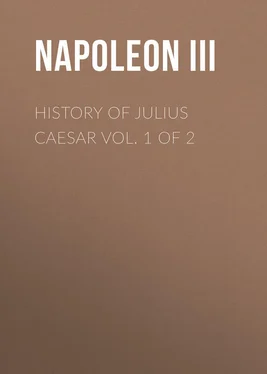Napoleon III - History of Julius Caesar Vol. 1 of 2
Здесь есть возможность читать онлайн «Napoleon III - History of Julius Caesar Vol. 1 of 2» — ознакомительный отрывок электронной книги совершенно бесплатно, а после прочтения отрывка купить полную версию. В некоторых случаях можно слушать аудио, скачать через торрент в формате fb2 и присутствует краткое содержание. Жанр: foreign_antique, foreign_prose, Биографии и Мемуары, на английском языке. Описание произведения, (предисловие) а так же отзывы посетителей доступны на портале библиотеки ЛибКат.
- Название:History of Julius Caesar Vol. 1 of 2
- Автор:
- Жанр:
- Год:неизвестен
- ISBN:нет данных
- Рейтинг книги:5 / 5. Голосов: 1
-
Избранное:Добавить в избранное
- Отзывы:
-
Ваша оценка:
- 100
- 1
- 2
- 3
- 4
- 5
History of Julius Caesar Vol. 1 of 2: краткое содержание, описание и аннотация
Предлагаем к чтению аннотацию, описание, краткое содержание или предисловие (зависит от того, что написал сам автор книги «History of Julius Caesar Vol. 1 of 2»). Если вы не нашли необходимую информацию о книге — напишите в комментариях, мы постараемся отыскать её.
History of Julius Caesar Vol. 1 of 2 — читать онлайн ознакомительный отрывок
Ниже представлен текст книги, разбитый по страницам. Система сохранения места последней прочитанной страницы, позволяет с удобством читать онлайн бесплатно книгу «History of Julius Caesar Vol. 1 of 2», без необходимости каждый раз заново искать на чём Вы остановились. Поставьте закладку, и сможете в любой момент перейти на страницу, на которой закончили чтение.
Интервал:
Закладка:
150
It results from the testimony of Polybius, Dionysius of Halicarnassus, Livy, Florus, and Eutropius, that at the moment of the fall of Tarquinius Superbus, the domination of Rome extended over all Latium, over the greater part of the country of the Sabines, and even as far as Ocriculum ( Otricoli ) in Umbria; that Etruria, the country of the Hernici, and the territory of Cære ( Cervetri ), were united with the Romans by alliances which placed them, with regard to these, in a state of subjection.
The establishment of the consular government was, for the peoples subject to Rome, the signal of revolt. In 253, all the peoples of Latium were leagued against Rome; with the victory of Lake Regillus, in 258, that is, fourteen years after the overthrow of the Tarquins, the submission of Latium began, and it was finished by the treaty concluded by Spurius Cassius with the Latins in the year of Rome 268. The Sabines were only finally reduced by the consul Horatius in 305. Fidenæ, which had acknowledged the supremacy of Tarquin, was taken in the year 319, then taken again, after an insurrection, in 328. Anxur ( Terracina ) was only finally subjected after the defeat of the Volsci; and Veii and Falerium only fell under the power of the Romans in the year 358 and 359. Circci, where a Latin colony had been established in the times of the kings, only received a new one in the year 360. Cære was reunited to the Roman territory in the year 364, and it was only at the time of the Gallic invasion that Antium and Ecetra were finally annexed to the Roman territory. In 408, the capture of Satricum, at the entrance of the country of the Volscians, prevented that people from supporting an insurrection which had already begun among the Latins. In 411, the whole plain of Latium was occupied by Roman citizens or allies, but in the mountains there remained Volscian and Latin cities which were independent and secretly enemies. Nevertheless it may be said that, towards that period, the Republic had re-conquered the territory which it possessed under the kings, although Rome had again, in 416, to suppress a last insurrection of the Latins.
151
Mommsen, Roman History , I., p. 241, 2nd edit.
152
In fourteen years, from 399 to 412, the patricians allowed only six plebeians to arrive at the consulship.
153
Titus Livius, X. 23.
154
Titus Livius, X. 9.
155
“Who does not see clearly that the vice of the dictator (Marcellus) in the eyes of the augurs was that he was a plebeian?” (Titus Livius, VIII. 23. – Cicero, De Divinatione , II. 35, 37; De Legibus , II. 13.)
156
The consuls and prætors could only assemble the comitia, command the armies, or give final judgment in civil affairs, after having been invested with the imperium and with the right of taking the auspices ( jus auspiciorum ) by a curiate law.
157
Second Oration on the Agrarian Law , 9.
158
Titus Livius, IV. 3.
159
If a citizen refused to give his name for the recruitment, his goods were confiscated; if he did not pay his creditors, he was sold for a slave. Women were forbidden the use of wine. (Polybius, VI. 2.) – The number of guests who could be admitted to feasts was limited. (Athenæus, VI. p. 274.) – The magistrates also, on entering on office, could not accept invitations to dinner, except from certain persons who were named. (Aulus Gellius, II. 24. – Macrobius, II. 13.) – “Marriage with a plebeian or a stranger was surrounded with restrictive measures; it was forbidden with a slave or with a freedman. Celibacy, at a certain age, was punished with a fine.” (Valerius Maximus, II. ix. 1.) – There were regulations also for mourning and funerals. (Cicero, De Legibus , II. 24.)
160
Aulus Gellius, IV. 12.
161
Plutarch, Cato the Censor , 23.
162
Historians have always assigned as the northern frontier of Italy, under the Republic, the River Macra, in Etruria; but that the limit was farther south is proved by the fact that Cæsar went to Lucca to take his winter quarters; this town, therefore, must have been in his command and made part of Cisalpine Gaul. Under Augustus, the northern frontier of Italy extended to the Macra.
163
Speech of Cæsar to the Senate, reported by Sallust. ( Conspiracy of Catilina , li.)
164
This paragraph, expressing with great clearness the policy of the Roman Senate, is extracted from the excellent Hist. Romaine of M. Duruy, t. I., c. xi.
165
As, for example, to put the wife in complete obedience to her husband; to give the father absolute authority over his children, etc.
166
In the origin, the municipia were the allied towns preserving their autonomy, but engaging to render to Rome certain services ( munus ); whence the name of municipia. ( Aulus Gellius , XVI. 13.)
167
To be able to enjoy the right of city, it was necessary to be domiciliated at Rome, to have left a son in his majority in the municipium, or to have exercised there a magistracy.
168
Aul. Gellius, XVI. xiii. – Paulus Diaconus, on the word Municipium , p. 127.
169
In this category were sometimes found municipia of the third degree, such as Cære. (See Festus, under the word Præfecturæ , p. 233.) – Several of these towns, such as Fundi, Formiæ, and Arpinum, obtained in the sequel the right of suffrage; they continued, however, by an ancient usage, to be called by the name of præfecturæ , which was also applied by abuse to the colonies.
170
Socius et amicus (Titus Livius, XXXI. 11). – Compare Dionysius of Halicarnassus, VI. 95; X. 21.
171
With Carthage, for example. (Polybius, III. 22. – Titus Livius, VII. 27; IX. 19, 43.)
172
Thus with the Latins. “Ut eosdem quos populus Romanus amicos atque hostes habeant.” (Titus Livius, XXXVIII. 8.)
173
Cicero, Oration for Balbus , xvi.
174
The freedmen were, in fact, either Roman citizens, or Latins, or ranged in the number of the dediticii ; slaves who had, while they were in servitude, undergone a grave chastisement, if they arrived at freedom, obtained only the assimilation to the dediticii . If, on the contrary, the slave had undergone no punishment, if he was more than thirty years of age, if, at the same time, he belonged to his master according to the law of the quirites, and if the formalities of manumission or affranchisement exacted by the Roman law had been observed, he was a Roman citizen. He was only Latin if one of these circumstances failed. ( Institutes of Gaius, I. § 12, 13, 15, 16, 17.)
175
“Valerius sent upon the lands conquered from the Volsci a colony of a certain number of citizens chosen from among the poor, both to serve as a garrison against the enemies, and to diminish at Rome the party of the seditious.” (Year of Rome 260.) (Dionysius of Halicarnassus, VI. 43.) – This great number of colonies, by clearing the population of Rome of a multitude of indigent citizens, had maintained tranquillity (452). (Titus Livius, X. 6.)
Читать дальшеИнтервал:
Закладка:
Похожие книги на «History of Julius Caesar Vol. 1 of 2»
Представляем Вашему вниманию похожие книги на «History of Julius Caesar Vol. 1 of 2» списком для выбора. Мы отобрали схожую по названию и смыслу литературу в надежде предоставить читателям больше вариантов отыскать новые, интересные, ещё непрочитанные произведения.
Обсуждение, отзывы о книге «History of Julius Caesar Vol. 1 of 2» и просто собственные мнения читателей. Оставьте ваши комментарии, напишите, что Вы думаете о произведении, его смысле или главных героях. Укажите что конкретно понравилось, а что нет, и почему Вы так считаете.












